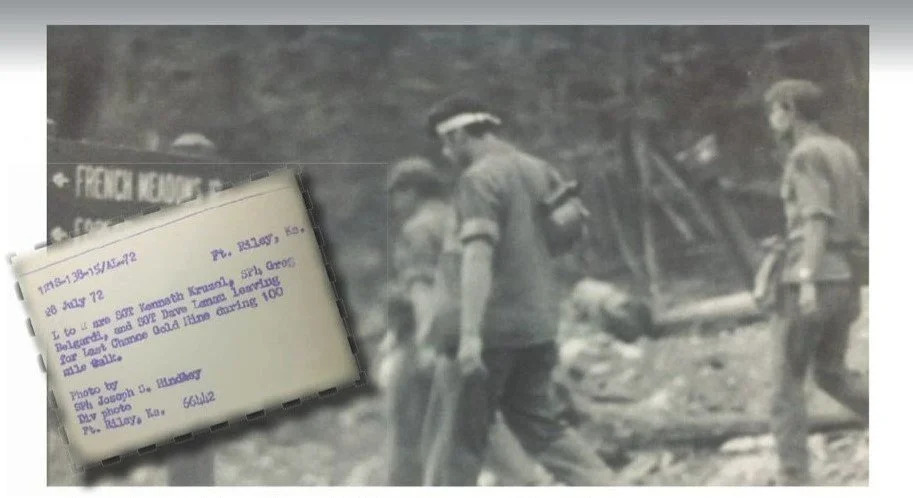1st Infantry Hosts Tevis Cup
Sometimes, an important event in history goes untold. Perhaps at the time the story didn’t seem important, or as often is the case, it was simply forgotten. One such story is the 1972 Fort Riley 1st Infantry “100 Mile Walk ” over the Western States Trail.
At the time, the annual Tevis Cup horseback ride was the only organized endurance event on the trail. Captain Joseph McCarthy of the Fort Riley 1st Infantry division learned of the Tevis Cup from his wife, Mary. She had completed the 1967 Tevis ride and was impressed with the event. McCarthy was looking for a stamina and endurance opportunity for his soldiers and his wife suggested he look into Tevis and the possibility of having his soldiers walk the trail during the 24-hour event.
It was an auspicious suggestion as Fort Riley, which is located outside of Manhattan, Kansas, was initially put in place in 1853 to protect overland trails. Since that time, the Army post has had an important role in the defense of our nation and the training of our soldiers.
In 1972, the United States military had been entrenched in the contentious Vietnam War for nearly 10 years, with the heaviest involvement in 1969. Consequently, in 1972 two-thirds of our troops had been returned home.
Due to the heated protests, our Vietnam military did not return home to a hero’s welcome. The unprecedented controversy was a heavy toll to bear. Military commanders were searching for ways to boost soldiers’ morale while keeping them in top physical condition. This was the aim for the soldiers’ endurance team from Fort Riley, Kansas.
Captain McCarthy contacted Wendell Robie, founder and president of the Tevis organization, to ask for permission for a 20-man contingent to participate in the event on foot, over a 48-hour period. Robie, an Army supporter, happily granted the request.
On July 28, 1972, one day ahead of the Tevis, 20 Fort Riley soldiers began their journey on the Western States Trail, with 10 local soldiers in place as their support team. The men were dressed in full military fatigues, including leather boots.
One soldier remembers, “It was the first time I had been in the western part of the country. … I didn’t know what to expect.”
Most of the soldiers had served in Vietnam, which involved hiking in heavy jungles and swamps. Conversely, the trail they were to hike starts at 6,200 feet elevation, then immediately rises to Emigrant Pass at 8,750 feet elevation. The trail then covers 15,000 feet of ascents and descents through canyons and mountains. It was a much different scenario than Vietnam, or where they had trained in Kansas.
After the first 20 miles in the thin air, the group’s leaders emerged. It became obvious they needed to split up to have any chance of at least some of the men finishing in the 48-hour timeframe. They went forward in smaller groups. Sergeant Mike Paduano said, “I don’t see how we made it. … I guess it was watching the scenery that kept me going.”
The soldiers continued on. Lt. Hall said, “We had to stick together towards the end. We needed a collective effort to finish. There were times when one of us would feel like quitting, but the added moral support kept us together.”
Seven of the original 20 men finished the hike in under 48 hours, with the seventh soldier coming in at 46 hours and 49 minutes. The men were recognized at the Tevis Cup awards dinner the following evening.
The Fort Riley Post reported, “Seven Air Defenders finish 100- mile hike. The winners of the ‘First Finishers on Foot’ trophy was presented by the Western States Trail Ride (Tevis Cup).”
Terryl Reed, current vice president of the Western States Trail Museum board of directors, and past chairman of the Tevis Cup Historical Committee, was present at the 1972 ceremony. When Wendell Robie presented the trophy to the soldiers, Reed remembers it vividly. She says, “When I saw those men in their full military uniforms, including boots, I couldn’t believe it. I turned to my sister and said, ‘What an accomplishment.’ ”
Now the story is told. The U.S. Army 100-mile hike on the Western States Trail is history we can be proud of!




